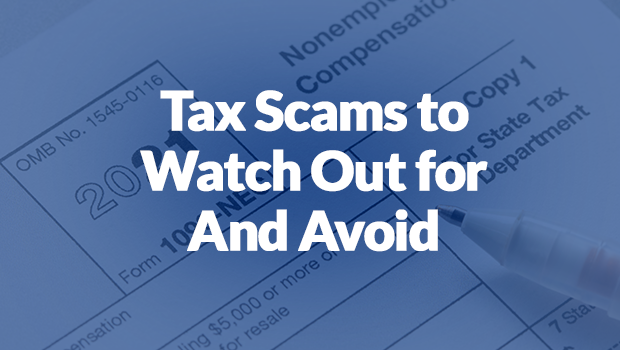The desire to steal other people’s money has probably been around since the invention of money. The only thing that’s changed over time has been the lies criminals tell to get that money. Because of the emotional reaction people often have to the IRS, many scammers focus on taxes as a means of tricking their potential victims. Let’s take a look at some of the newer and more common schemes you and other taxpayers are likely to see this tax season.
Tax Scam #1: Submitting False W-2 Wage Information to the IRS
This one’s been getting a lot of attention on social media and works by using tax preparation software to fill out a fake Form W-2, Wage and Tax Statement. The taxpayer lists a fake employer along with fake income and withholding information. The income and withholding values are enlarged to make it more likely the taxpayer will receive a bigger tax refund from the IRS.
The IRS is aware of this scam and will verify W-2 wage information with large employers, payroll companies and the Social Security Administration. If the IRS catches you trying this scam, you might have to pay a frivolous return penalty of $5,000 and/or face criminal charges for filing a frivolous tax return.
Tax Scam #2: Submitting a False Form 7202 or Schedule H Form to the IRS
This scam is similar to the W-2 scheme discussed earlier in that taxpayers submit false documents to the IRS. In one version, taxpayers use Form 7202, Credits for Sick Leave and Family Leave for Certain Self-Employed Individuals to claim a tax credit under the Families First Coronavirus Response Act. The problem is that taxpayers are claiming this credit even though they’re employees and not self-employed individuals.
In another version, taxpayers make up non-existent employees who work for their household. They then submit Schedule H (Form 1040), Household Employment Taxes to claim a tax refund for wages they never paid (because the employees didn’t exist).
Even though these scams aren’t necessarily used by thieves to take money from unsuspecting taxpayers, taxpayers can find themselves becoming victims when they heed the advice from unscrupulous individuals to attempt these tax “strategies.” Taxpayers trying to submit false information to the IRS in either of these schemes could be on the hook for criminal charges and frivolous return penalties.
Tax Scam #3: The Unexpected Delivery
A bread-and-butter tax scam that’s been around for a while is identity theft. Whether it’s an email, telephone call, text message, or letter, the scammer pretends to be from the IRS and asks for personal information from the taxpayer.
In this relatively new scam, the con person will mail a package to the taxpayer. The package is a cardboard envelope with an official-looking IRS letter inside. This letter tells the taxpayer they have an unclaimed refund and if they want to receive this money, they’ll have to submit personal information. This information can include:
- Pictures of the taxpayer’s driver’s license
- Social Security number
- Mobile phone number
- Bank routing information and account type
After obtaining this information, scammers steal the taxpayer’s identity to claim a false tax refund or engage in other financial crimes.
Tax Scam #4: The Aggressive Tax Preparer
This is another “classic” tax scam where unethical or criminal tax preparers promise huge tax refund checks or other tax benefits. In return, they charge the taxpayer a significant amount of money, whether it’s a percentage of the “refund” obtained or a flat fee.
What makes this scam especially sneaky is that the tax preparer probably uses a legitimate tax strategy or program. However, they likely have the taxpayer apply for programs the taxpayer isn’t eligible for, such as the Employee Retention Credit (ERC). Or they have the taxpayer request a credit that’s far higher than what the taxpayer should receive. By the time the taxpayer figures out what’s happened, they’ve already paid the tax preparer who’s likely long gone.
How to Protect Yourself
As bad as these tax scams are, you can usually avoid them with some common sense and a little bit of knowledge about how the IRS works. Here are common signs that someone is trying to scam you or is not from the IRS despite claiming they are:
- Initial contact is made by telephone, text message, email or social media. When the IRS contacts a taxpayer about a tax bill or refund, it’s almost always with a letter by regular mail.
- The person mentions a tax program, policy, form or document that’s not on the IRS’ website.
- The scammer asks for payment with a gift card or prepaid debit card.
- The promises sound too good to be true.
- The scammer asks for credit or debit card information over text, telephone or email.
- They make threats of arrest, deportation, loss of a business license or driver’s license.
- The con person pretends to be a friend or family member.
If you feel like you’ve been the victim of a tax scam or someone is trying to scam you, you should report it. You have several options available, including contacting the Treasury Inspector General for Tax Administration, the Internet Crime Complaint Center or the Federal Trade Commission. You should also consider filing IRS Form 3949-A, Information Referral to report possible tax law violations and/or IRS Form 14039, Identity Theft Affidavit if you’re the victim of identity theft.
Kienitz Tax Law is here to help you with your tax issues. Schedule your FREE consultation today!

